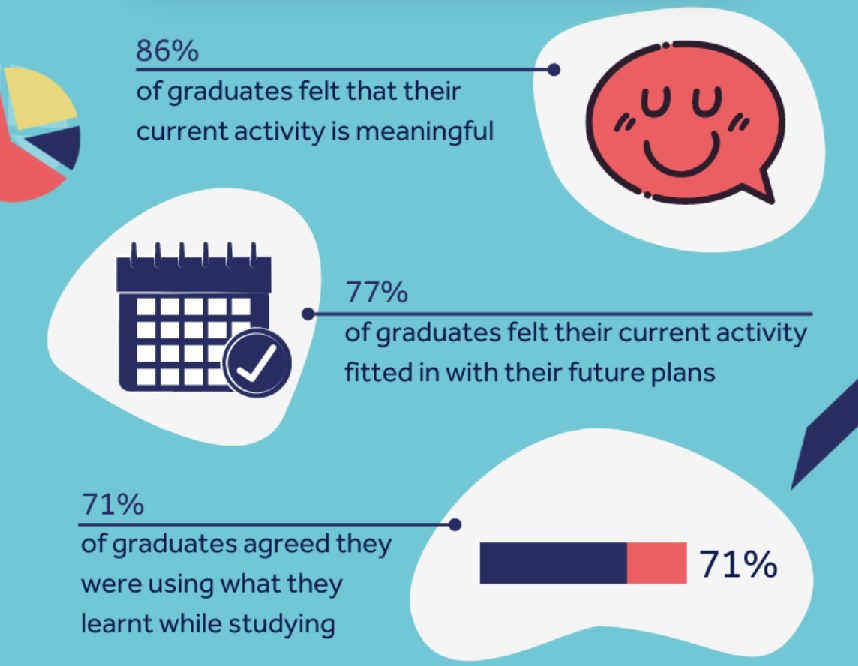National Careers Week: Career trends of graduates from the class of 2019/20
What do we know about graduates and their chosen career paths? And how can we use data to help graduates and future students? These questions are at the heart of the Graduate Outcomes survey.
The UK’s biggest annual social survey
The Graduate Outcomes survey asks graduates about their experience of higher education and what they are doing 15 months post-graduation. It is the UK’s biggest annual social survey with over 400,000 graduates sharing their experiences every year.
The data from the survey tells us more about trends in education and work which is used to help future students choose their career paths and for providers of higher education to tailor career support and shape courses. You’ll see the data on university and college websites, platforms like Discover Uni, as well as in national news.
The Graduate Outcomes survey is managed by the Higher Education Statistics Agency, part of Jisc: the UK digital, data and technology agency, in collaboration with UK universities and colleges.

Infographic showing 403,835 graduates surveyed in 2019-20 and their employment status
What’s the latest data on graduate career choices?
The latest data covers the cohort who graduated into COVID – they left university during the most severe lockdowns in summer 2020, in the most difficult jobs market for decades. But they were surveyed the following winter, with a vaccine rolled out and most restrictions lifted, and the results are heartening.
Employment rates show admirable graduate resilience. 80% of graduates from the class of 2019/20 were employed either full time (with or without further study), or part time, with a small number working unpaid or on a voluntary basis. 20% were in further study, either solely, or alongside work. Short, one year Masters qualifications remained the most common qualification for this group, as they usually are, with teaching courses a little way behind and graduates taking doctoral study also in the group.
5.8% were unemployed at the time of the survey, but 28% - well over a quarter – of them had a job or, less commonly, a course of study, lined up to go to and so only 4.2% of the cohort were unemployed and did not have something to go to within a month. This is quite similar to the figures we might expect for a ‘normal’ year and demonstrates the employability, resilience and adaptability of UK graduates, and how rapidly the graduate labour market had rebounded from COVID.
Of those who were working, 67% were in permanent, full time roles and another 15% on fixed term contracts – note that this latter is very common amongst professionals on qualifying years, such as junior doctors, and should not be seen as necessarily a sign of insecure employment.
A tale of many cities: About 23% of graduates from the class of 2019/20 started their career in London (most graduates don’t work in the capital, and never will), with other important locations being the main cities; Birmingham, Manchester, Leeds, Glasgow, Edinburgh, Cardiff and particularly for tech graduates, Belfast. All these cities have large, diverse graduate jobs markets and employ many thousands of graduates every year.
Starting salaries for this group of graduates who were working full time was £24,979 on average. However, nearly a quarter start their career in London (average salary for graduates £27,338), where costs of living are substantially higher. Work Jisc did pre-pandemic suggests that the cost of living in some parts of the country, like London, is so high that you can earn several thousand pounds a year less in many cities with good jobs markets and still be better off after all your bills have been accounted for – so do bear this in mind.
Jisc produces an annual report, What do graduates do?, that summarises a lot of the available data about graduates from Graduate Outcomes for careers leaders in schools, parents and students so that you can make informed career choices.

Infographic showing graduate satisfaction 2019/20
How does this data relate to the wider labour market and trends?
COVID had an impact on the wider labour market that will continue to play out over the forthcoming years.
Since COVID we have had significant shortages of professionals in many areas of tech and business services. Part of this is due to the adoption of new remote working technologies and processes. Part is due to workers, particularly older ones, leaving the workforce. Some of it is due to the impact of changes (both political and social) in the way the UK interacts with the rest of the world that means that overseas professionals are now not working here in such large numbers and covering our training shortfalls. All of this means that demand for graduates in many areas is strong despite the current economic downturn.
The shortage of professionals and the effects of COVID means it has been harder for small businesses than larger ones to keep their workers, grow and thrive.
The new status quo...
Since the start of COVID, 80% of IT workers, 70% of professional services workers and the majority of non-classroom workers in education are now working wholly or partly from home. Most ‘hybrid workers’ have degrees and many graduates will work this way in future. This has consequences for the way our working lives, and our towns and cities, will look in the future that have yet to play out.
So what will the data from the class of 2020/21 tell us?
The results and analysis of the latest Graduate Outcomes survey for graduates of the class of 2020/21 will be published in May 2023. We expect there to be some interesting new trends with more data to show how the Covid-19 pandemic has impacted on graduates’ choices and opportunities.
Follow @Grad_Outcomes @ukHESA on social media for the latest news, data and statistics on #HigherEducation.

Charlie Ball
